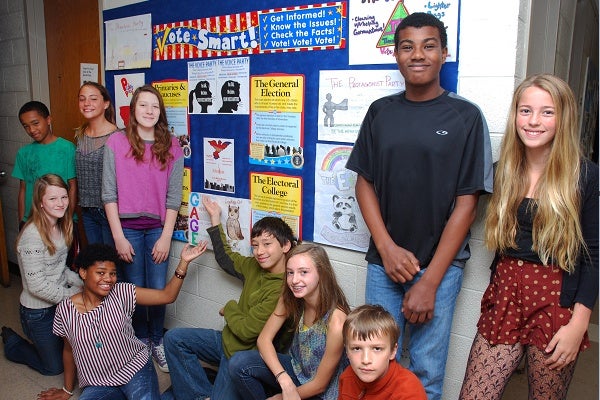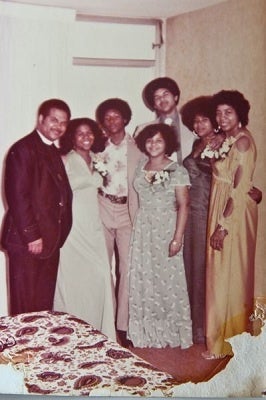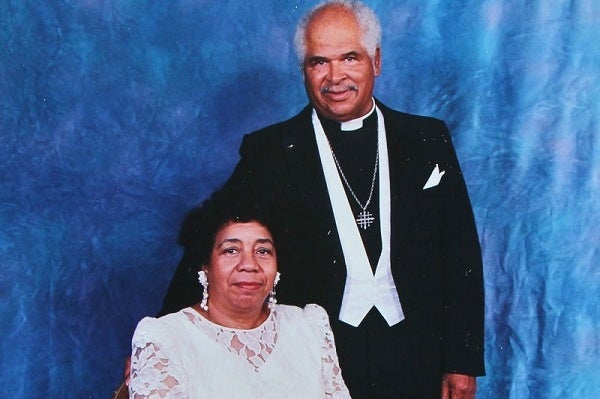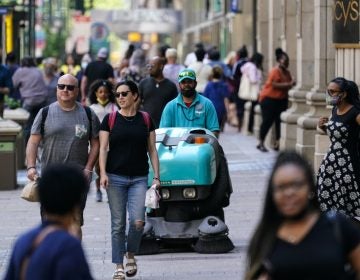Germantown civil-rights activist reflects on 83 years of life and work still to be done
It’s not every day that you meet a civil-rights activist, especially one who had Dr. Martin Luther King Jr. and his wife, Coretta, at her dinner table.
“He loved my collard greens,” recalled Angela DuBose, an Evanston, Ill. native who now resides in Germantown.
NewsWorks met Angela at a Fourth of July event and, in the time since, she has shared stories about her unique history as a feminist and civil-rights activist.
A storied past
While living in Montgomery, Ala. in the late 50s and early 60s, Angela and her husband, Rev. Robert E. DuBose, worked alongside Dr. King and helped organize the Montgomery Improvement Association.
“My kids remember the prejudice, but times have changed,” recalled Angela, who attended bus boycotts and sit-ins. “Now we have a black president. Did I think the day would come when we would have a black president? I always hoped it would. Now we do, we have President Obama.”
Angela said she has been voting for as long as she can remember. She credited her mother, who was a teacher, for instilling in her the value of voting from an early age.
“My mother was a black suffragette,” said Angela. “She marched in Illinois for our right to vote. And just look at how far women have come today. Never forget that.”
Fighting for civil-rights in Alabama
When Angela met her husband in the 1950s, she had already received both her bachelor and master’s degrees at Northwestern University with a focus on science, math and psychology.
“I knew I wanted to become a teacher. My mother was a teacher, and my father was a reverend. We always had books in my house growing up,” she said.
The story goes like this: Angela was working as a laboratory technician on campus while her husband-to-be was working on his master’s in theology at nearby Seabury-Western Theological Seminary.
“I met Robert at a social, and he asked me to dance. I said, I will, but tell me your name first,” said Angela, laughing.
The couple soon married and relocated to Montgomery where Robert took a job as a vicar of the Church of the Good Shepherd.
“We became involved with Dr. King and we really became a part of the movement,” said Angela, who says she attended civil rights meetings at local churches. “We wanted to encourage people to vote. We wanted fair housing, just basic things.”
Facing adversity daily
Talking about that era, Angela cited the fact that even though she lived a half block away from a hospital, she wasn’t permitted to go.
“It was an all-white hospital,” said Angela. “I had to drive miles to another hospital. When my baby daughter was choking and had something lodged in her throat, I had to hope I’d make it in time to the other hospital.”
She described that during that time, blacks couldn’t even try on hats or shoes at stores. She recalled a family trip where she wasn’t able to let her children go to a nearby restaurant and amusement park.
“You know, my children, they didn’t understand,” said Angela. “They thought it was us just being ‘mean’ parents. How do you explain that to your children?”
Their involvement in the civil rights movement caused their phone line to be tapped, and threats to be made to their home.
“My husband and I were playing chess one night, and we heard a car crash down the street,” she recounted. “When we went outside, we found out that a man who crashed his car had a black book with our address in it. It was full of addresses of people we worked with and addresses of churches; they were on that list to be bombed. You can imagine the fear.”
Robert Dubose was even arrested for protesting at a segregated restaurant, but challenged the case in “Robert E. DuBose Jr., v. The City of Montgomery.”
“It was very scary,” said Angela, “but I knew we would win, we had to win. I believed.”
The court ruled in his favor and made it legal for blacks and whites to eat together in restaurants.
Jim Crow and voter ID
She said Pennsylvania’s controversial voter ID law showed her that “there is still opposition against people in this country.”
“It makes you remember the struggles that people have had just to vote in this country,” she said. “I was forced to pay poll tax to vote because of Jim Crow laws.”
She discussed that having to pay an actual tax charged to people trying to vote disenfranchised thousands of African Americans and low-income voters.
“When I heard about the voter ID law, I couldn’t believe it,” said Angela of a measure that will not be enforced in November’s elections. “It’s another way of controlling who should vote and who should not. I don’t think it’s a fair law.”
She noted that women have come “a long way” since her mother marched. Yet, during the Civil Rights Movement, she saw women unite with each other first hand.
“So many of the white women supported us,” said Angela. “So many came to meetings, to the churches. They donated money and marched with us. Some even lost their husbands or their husbands lost their jobs because of it. It wasn’t just a black thing. We were all there, together. Truly, women are magnificent.”
What she’s doing today
By 1961, the couple relocated to Philadelphia where the reverend became a pastor at St. Thomas Episcopal Church in West Philadelphia. He later worked at St. Cyprians, St. Barnabas and the West Oak Lane House of Prayer. Angela began teaching math and science at a local high school.
“We made a life here in Philadelphia,” said Angela. “We settled down and raised our kids.”
Now widowed, Angela said she has seen a lot during her 83 years.
“Many things have changed, but there is still work to be done,” said Angela. “Young people need to educate themselves. They need to realize the value of voting. They need to recognize what people went through, like my mother, to get them that right. There is still adversity today, we still have a long way to go.”
She added that women play an important role in moving forward.
“Women are strong. We have come a long way,” said Angela. “As women, we need to stand together and keep on doing great things in the world.”
WHYY is your source for fact-based, in-depth journalism and information. As a nonprofit organization, we rely on financial support from readers like you. Please give today.








